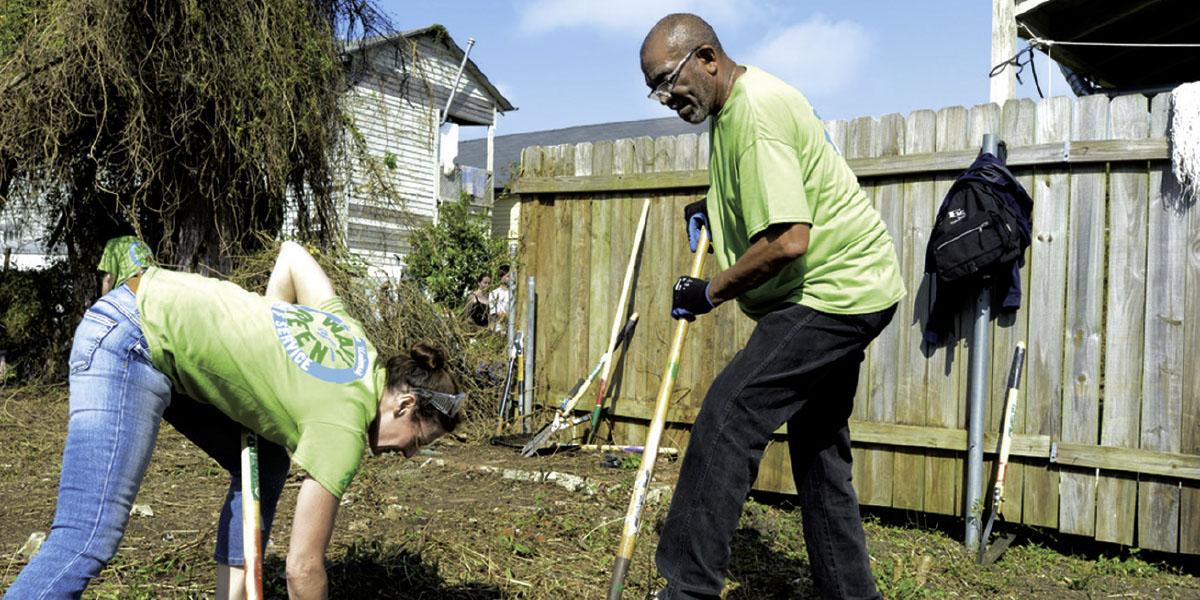It is ironic that Tulane Empowers traces its origins to a time when Tulane University was literally powerless. The university wide effort uses the knowledge, skills, and passion of our students, faculty, and staff to build a better world. The initiative came about in great part as a result of deadly Hurricane Katrina, which came ashore on Aug. 29, 2005.
The storm devastated Tulane and the entire city of New Orleans. More than 80 percent of our main campus and the entire medical center was under water. Students, faculty, and staff were dispersed across the country, while the university’s president, Scott Cowen, and other senior leaders were trapped in a campus building surrounded by water. “For all intents and purposes, Tulane University existed only as an idea,” Cowen recalls.
Against the Odds
Thanks to the efforts of Juan Perez, Tracy Boudreaux, and other Tulane facilities services staff, Cowen and his senior team were able to survive the storm. The two longtime employees did everything from keeping backup generators working to repairing the boat that would eventually bring Cowen and his staff to high ground where they could be rescued by helicopter.
That helicopter took Cowen to Patterson, Louisiana. He then caught a plane to Houston where, from a hotel room, he and his staff orchestrated the recovery of Tulane from near extinction. It was also from this unlikely setting that they laid the groundwork for Tulane Empowers.
Only the Strong Return
During one of his first trips back to Tulane after the storm, Cowen interacted with a group of students who were still deciding whether they would return to the university once it reopened. “If it’s not in your DNA to rebuild Tulane and New Orleans, don’t come back,” said Cowen. In other words, if students wanted to attend a school where learning was neatly laid out on a syllabus and dispensed within the comforts of a climate-controlled classroom, then Tulane was not the school for them.
The university needed only students who wanted to make a real difference in the world, to use the knowledge and skill acquired in the classroom to help rebuild a great American city—to empower Tulane, and, in turn, empower others.
As part of this effort, Tulane would become the first and only major research university in the country to make public service a core requirement of its undergraduate curriculum.

Transformative Tasks
It all began as local outreach:
- Tulane architecture students designed and built hurricane-safe homes to replace those destroyed by Katrina.
- Business students helped prepare business plans and marketing campaigns for stores and restaurants returning to New Orleans.
- English majors became tutors and reading buddies at local schools.
- Medical residents worked at clinics to provide care for the uninsured.
The list goes on and continues to this day. Only now, Tulane Empowers’ efforts have spread beyond New Orleans to include the global community as well as the efforts of Tulane faculty, staff, and alumni. Engineering students repair medical equipment in Tanzania; business students develop marketing plans for a food bank in Argentina; social work students assist Tibetan refugees in India.
Locally, law faculty help Mardi Gras Indians gain the same copyright protection for their creations that other artists enjoy, and staff pitch in for an annual Day of Service at schools and nonprofits throughout the city. Tulane University empowers others—and the heroes of Katrina continue to play a crucial role, providing transportation, tools, and know-how for many community projects.
“Katrina initially took away our power but then made us more determined to not only help ourselves, but to help others,” says Sylvester Johnson, senior associate vice president for facilities services. “If you think about it, that is what facilities services is all about. And it is certainly what Tulane is all about.”
SUBMITTED BY Tony Lorino, senior vice president for operations and chief financial officer, Tulane University, New Orleans.


